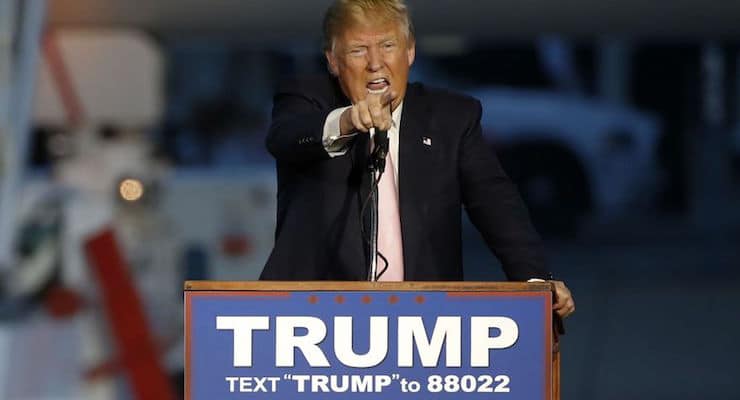

Donald J. Trump holds a campaign rally in Vienna, Ohio, ahead of the March 15 Super Tuesday 2.0 winner-take-all primaries. (Photo: AP/Gene J. Puskar)
Donald Trump, in recent comments to Bill Clinton’s former White House mouthpiece, George Stephanopoulos, told an ABC television audience that while a unified Republican Party is a good idea, he isn’t going to lose sleep if certain GOP members who oppose his candidacy don’t ever stop opposing his candidacy.
“We want to bring the party together,” Mr. Trump said, on “This Week” on ABC News. “Does the party have to be together? Does it have to be unified? I’m very different than everybody else, perhaps that’s ever run for office. I actually don’t think so.”
Mr. Stephanopoulos, for his part, seemed mystified by the response, and pressed the point that Speaker Paul Ryan, who refused to immediately board the Trump train, was “different,” that he was the “highest elected Republican in the country right now,” and dismissing this simple reality could result in a crushing blow to the billionaire businessman’s entire campaign.
Well, it won’t. In fact, failing to kowtow to the established powers-who-be in and around Washington – not only Mr. Ryan, but other respected Republicans like George H.W. Bush, George W. Bush, Jeb Bush and Mitt Romney – will only give yet another notch to the Trump belt of candidacy. Note to GOP: the more the party cries, the higher Mr. Trump’s numbers rise.
It’s the outsider image that’s fueled his campaign thus far – that, and the simple vow to take down the establishment, brick by border wall brick. Just a few months ago, the argument against Mr. Trump was he was a buffoon. But he’s beaten back all his Republican challengers and now stands alone, the sole pick of the party.
So the argument’s shifted to focus on his chances of beating likely Democratic nominee Hillary Clinton. And his detractors say, with just as straight a face and just as much vehemence as they did months ago while calling him an imbecile, circus act and worse, that he can’t beat Mrs. Clinton.
Yet polls are starting to show otherwise on that point.
A Military Times survey conducted in early May of 951 active duty members, reservists and National Guardsmen found favor for Mr. Trump over Mrs. Clinton, 54 percent to 25 percent, and over the self-declared socialist Sen. Bernie Sanders, 51 percent to 38 percent.
A Rasmussen Reports poll conducted in late April gave the General Election win to Mr. Trump, not Mrs. Clinton, by a margin of two percentage points. And while several other polls paint Mrs. Clinton as the clear leader in a face-to-face matchup against Mr. Trump, the closer election day comes, the tighter the margins become and in fact, it won’t be long before more headlines, like this May 10 one from Vox, appear on the horizon: “Reality check: Hillary Clinton’s lead over Donald Trump is not that big, and could vanish.”
And you know what else will likely vanish in the weeks to come?
Mr. Trump’s inner-party detractors, particularly ones presently in office. They’ll have to, else face the ire of Republican voters at the polls in their own upcoming elections. Talk of third party candidates is all smoke and mirrors; little more than howling and hubris from the diehard disbelievers – just the type who would during this nation’s formative years rally around Alexander Hamilton while scoffing at Thomas Jefferson.
The reference is not casual.
Founding Fathers didn’t intend for the country’s politics to be run by parties. Rather, as George Washington himself warned in his 1796 Farewell Address, political parties would bring partisanship, division and ultimately, “despotism” and tyranny. He thought this even while appointing Alexander Hamilton as Treasury secretary and Thomas Jefferson as secretary of State – two men whose views of the rightful role of government couldn’t be more different. Hamilton favored a strong federal government; Jefferson, a stronger system of states’ rights. It’s their contrasting views that helped solidify the two-party system of politicking that stands to this day.
What would Washington say today?
He’d likely look at the division within the GOP, the rancor and very “spirit of revenge” he warned of taking root with a two-party system – a spirit that seems aimed in modern times at Mr. Trump — and shake his head sadly while muttering, in some manner of speech more natural to his era: Told you so.
[mybooktable book=”the-devil-in-dc” display=”summary” buybutton_shadowbox=”true”]





